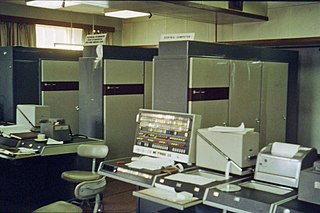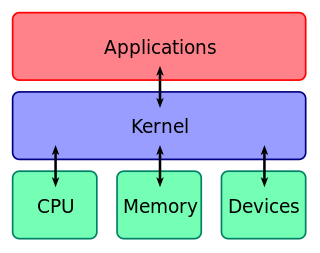Related Research Articles

The history of computing hardware covers the developments from early simple devices to aid calculation to modern day computers.

In computer science, a microkernel is the near-minimum amount of software that can provide the mechanisms needed to implement an operating system (OS). These mechanisms include low-level address space management, thread management, and inter-process communication (IPC).
In distributed computing, a remote procedure call (RPC) is when a computer program causes a procedure (subroutine) to execute in a different address space, which is written as if it were a normal (local) procedure call, without the programmer explicitly writing the details for the remote interaction. That is, the programmer writes essentially the same code whether the subroutine is local to the executing program, or remote. This is a form of client–server interaction, typically implemented via a request–response message passing system. In the object-oriented programming paradigm, RPCs are represented by remote method invocation (RMI). The RPC model implies a level of location transparency, namely that calling procedures are largely the same whether they are local or remote, but usually, they are not identical, so local calls can be distinguished from remote calls. Remote calls are usually orders of magnitude slower and less reliable than local calls, so distinguishing them is important.

The Williams tube, or the Williams–Kilburn tube named after inventors Freddie Williams and Tom Kilburn, is an early form of computer memory. It was the first random-access digital storage device, and was used successfully in several early computers.

Regnecentralen (RC) was the first Danish computer company, founded on October 12, 1955. Through the 1950s and 1960s, they designed a series of computers, originally for their own use, and later to be sold commercially. Descendants of these systems sold well into the 1980s. They also developed a series of high-speed paper tape machines, and produced Data General Nova machines under license.

The Department of Computer Science at the University of Manchester is the longest established department of Computer Science in the United Kingdom and one of the largest. It is located in the Kilburn Building on the Oxford Road and currently has over 800 students taking a wide range of undergraduate and postgraduate courses and 60 full-time academic staff.

The Manchester Baby, also called the Small-Scale Experimental Machine (SSEM), was the first electronic stored-program computer. It was built at the University of Manchester by Frederic C. Williams, Tom Kilburn, and Geoff Tootill, and ran its first program on 21 June 1948.

Tom Kilburn was an English mathematician and computer scientist. Over his 30-year career, he was involved in the development of five computers of great historical significance. With Freddie Williams he worked on the Williams–Kilburn tube and the world's first electronic stored-program computer, the Manchester Baby, while working at the University of Manchester. His work propelled Manchester and Britain into the forefront of the emerging field of computer science.

Per Brinch Hansen was a Danish-American computer scientist known for his work in operating systems, concurrent programming and parallel and distributed computing.

Titan was the prototype of the Atlas 2 computer developed by Ferranti and the University of Cambridge Mathematical Laboratory in Cambridge, England. It was designed starting in 1963, and in operation from 1964 to 1973.
The RC 4000 Multiprogramming System is a discontinued operating system developed for the RC-4000 minicomputer in 1969. For clarity, this article mostly uses the term Monitor.
Concurrent computing is a form of computing in which several computations are executed concurrently—during overlapping time periods—instead of sequentially—with one completing before the next starts.
Concurrent Pascal is a programming language designed by Per Brinch Hansen for writing concurrent computing programs such as operating systems and real-time computing monitoring systems on shared memory computers.
The separation of mechanism and policy is a design principle in computer science. It states that mechanisms should not dictate the policies according to which decisions are made about which operations to authorize, and which resources to allocate.

The Atlas was one of the world's first supercomputers, in use from 1962 to 1972. Atlas's capacity promoted the saying that when it went offline, half of the United Kingdom's computer capacity was lost. It is notable for being the first machine with virtual memory using paging techniques; this approach quickly spread, and is now ubiquitous.

The kernel is a computer program at the core of a computer's operating system and generally has complete control over everything in the system. The kernel is also responsible for preventing and mitigating conflicts between different processes. It is the portion of the operating system code that is always resident in memory and facilitates interactions between hardware and software components. A full kernel controls all hardware resources via device drivers, arbitrates conflicts between processes concerning such resources, and optimizes the utilization of common resources e.g. CPU & cache usage, file systems, and network sockets. On most systems, the kernel is one of the first programs loaded on startup. It handles the rest of startup as well as memory, peripherals, and input/output (I/O) requests from software, translating them into data-processing instructions for the central processing unit.

The Manchester computers were an innovative series of stored-program electronic computers developed during the 30-year period between 1947 and 1977 by a small team at the University of Manchester, under the leadership of Tom Kilburn. They included the world's first stored-program computer, the world's first transistorised computer, and what was the world's fastest computer at the time of its inauguration in 1962.

The Manchester Mark 1 was one of the earliest stored-program computers, developed at the Victoria University of Manchester, England from the Manchester Baby. Work began in August 1948, and the first version was operational by April 1949; a program written to search for Mersenne primes ran error-free for nine hours on the night of 16/17 June 1949.
SuperPascal is an imperative, concurrent computing programming language developed by Per Brinch Hansen. It was designed as a publication language: a thinking tool to enable the clear and concise expression of concepts in parallel programming. This is in contrast with implementation languages which are often complicated with machine details and historical conventions. It was created to address the need at the time for a parallel publication language. Arguably, few languages today are expressive and concise enough to be used as thinking tools.
Information technology (IT) is a set of related fields that encompass computer systems, software, programming languages, and data and information processing, and storage. IT forms part of information and communications technology (ICT). An information technology system is generally an information system, a communications system, or, more specifically speaking, a computer system — including all hardware, software, and peripheral equipment — operated by a limited group of IT users, and an IT project usually refers to the commissioning and implementation of an IT system. IT systems play a vital role in facilitating efficient data management, enhancing communication networks, and supporting organizational processes across various industries. Successful IT projects require meticulous planning, seamless integration, and ongoing maintenance to ensure optimal functionality and alignment with organizational objectives.
References
- Notes
- ↑ Lavington 1980, pp. 50–52.
- ↑ Brinch Hansen 2000.
- Works cited
- Brinch Hansen, Per (2000). Classic Operating Systems: From Batch Processing to Distributed Systems. Springer-Verlag.
- Lavington, Simon (1980). Early British Computers. Manchester University Press. ISBN 0-7190-0803-4.